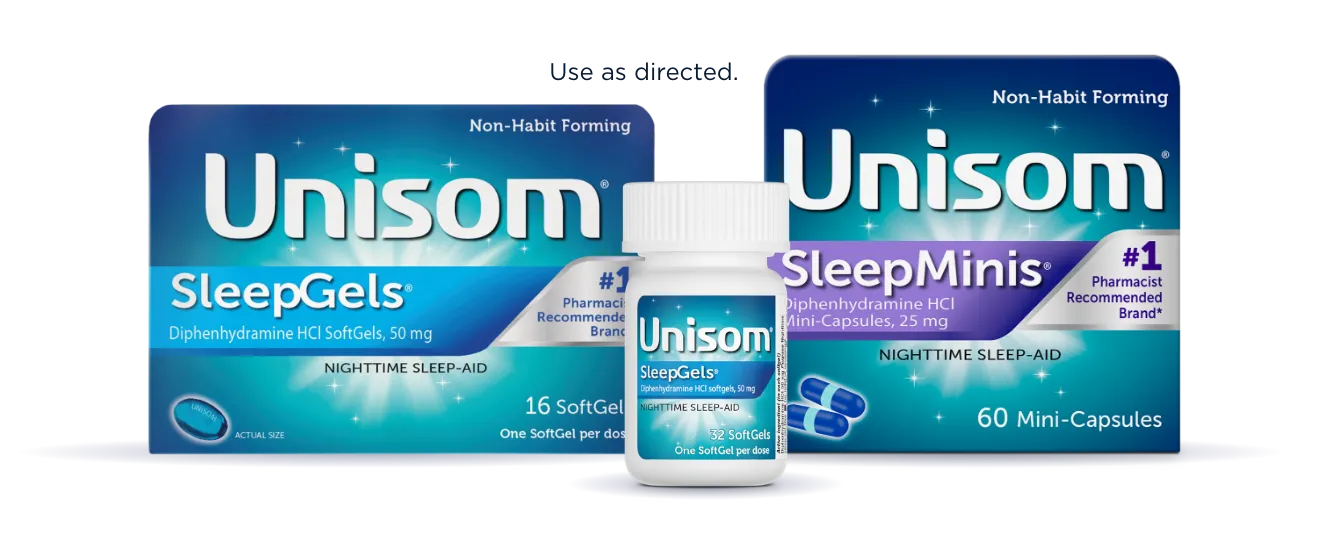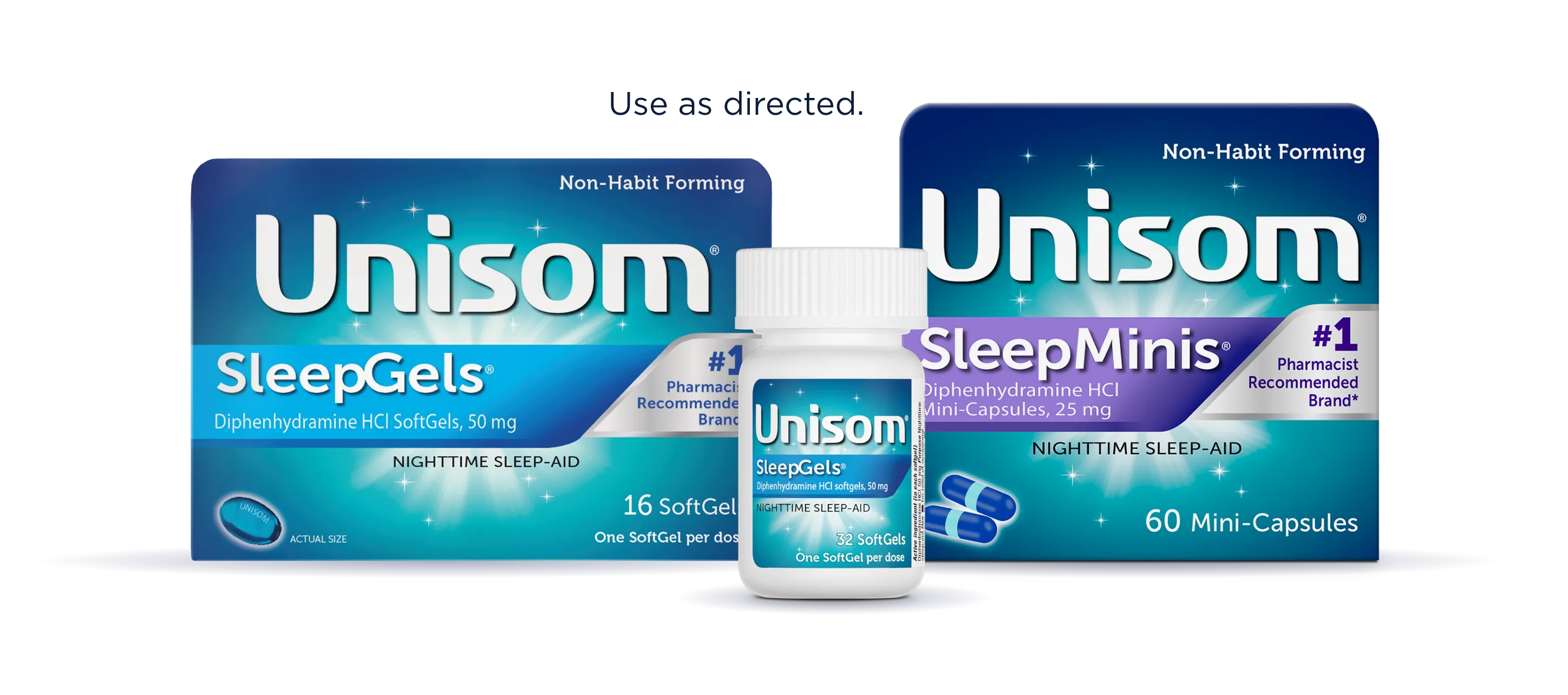Believe it or not, one in three adults don’t get enough sleep.¹ If you’re one of the lucky two out of three, you can maybe skip this article. But for those sleep-deprived among us, read on.
Do you have a tough time falling asleep? Or maybe a hard time staying asleep? The answers to those questions will have a direct impact on choosing a sleep solution that best fits your needs.
Know your options
With so many choices out there, it might help to get an idea of the different drug-free supplement and medicinal options available to help you sleep. Over-the-counter medications often contain histamine blockers like doxylamine succinate. Blocking histamines can have a sedating effect, and help you get to sleep and stay asleep.2
As far as supplements go, melatonin is a hormone that your brain produces in response to darkness.3 It’s just one of the supplements you can use to help your body get the rest it needs.
Here’s a closer look at some of the most commonly used sleep supplements and over-the-counter drugs:
Melatonin
Melatonin is a hormone that is naturally produced in the body to regulate the sleep/wake cycle. It is not a sedative, but a natural cue that it's time to wind down. Being exposed to light at night can block our body’s natural production of melatonin.3 Taking a melatonin supplement can help increase melatonin level in the body, making it easier to “turn out the light” at bedtime. Travelers sometimes use melatonin to help with jet lag, and studies have also shown that it can help night-shift workers adjust their internal clock.3
Lemon balm
Lemon balm leaves have been used since the Middle Ages to help reduce stress, promote sleep, and ease the discomfort caused by indigestion.5 It is often combined with herbs like valerian and chamomile to promote relaxation.5 Lemon balm is available in different forms such as tea, capsules, drops, or topical cream.

Passionflower
This is another one from the history books, traditionally used in the Americas and Europe as a calming herb for anxiety and insomnia. The belief is that passionflower increases levels of certain chemicals in the brain helping you to feel more relaxed.6 Passionflower is available in infusions, teas, and liquid extracts.6
Valerian root
If you think valerian root sounds like something you might find in a medieval potion, you’re not far off: it’s been used as a medicinal herb since the time of ancient Rome and used specifically in connection with sleep since the 2nd century AD.7 You can buy valerian root as a powder, liquid, dried herb, pill, or tea.7
Diphenhydramine
Diphenhydramine is available in many popular over-the-counter sleep-aids.8 Your body releases histamines naturally, and when their production is blocked, it can make you feel drowsy. Sleep-aids with diphenhydramine can help you fall asleep quickly and wake up less frequently during the night.8
Doxylamine succinate
Like diphenhydramine, doxylamine works to block the production of histamines.8 Sleep-aids with doxylamine have been shown to help people fall asleep up to 33% faster and stay asleep longer through the night.
Rest assured
Unisom® is the #1 doctor recommended OTC sleep-aid brand, with a range of non-habit forming options to help you fall asleep and wake up feeling refreshed.
Unisom® SleepGels® contain the histamine blocker sleep-aid diphenhydramine HCI. Blocking histamine production can help you fall asleep faster and stay asleep.
Unisom® SleepTabs® contain doxylamine succinate, which is a clinically proven histamine blocker that works in a similar fashion to diphenhydramine. Unisom® SleepTabs® can help you fall asleep 33% faster and get a full night's sleep.
Find the Unisom® product that’s right for you.
Professional References
1. Centers for Disease Control and Prevention, Editors. 1 in 3 Adults Don’t Get Enough Sleep. Centers for Disease Control and Prevention (https://www.cdc.gov/).
2. Harvard Health Publishing, Editors. Are Drugstore Sleep Aids Safe? Harvard Health Publishing, Harvard Medical School (https://www.health.harvard.edu/). February 15, 2021.
3. National Center for Complementary and Integrative Health, Editors. Melatonin: What You Need To Know. National Center for Complementary and Integrative Health (https://www.nccih.nih.gov/)
4. Gerry Morton, MedFit Network. The Essential B Vitamins for Energy, Sleep and Metabolism: B2, B5, and B6. MedFit Network (https://medfitnetwork.org/public/). July 5, 2017.
5. Mount Sinai, Editors. Lemon Balm. Mount Sinai (https://www.mountsinai.org/)
6. Mount Sinai, Editors. Passionflower. Mount Sinai (https://www.mountsinai.org/)
7. National Institutes of Health, Editors. Valerian. National Institutes of Health, Office of Dietary Supplements (https://ods.od.nih.gov/)
8. Sleep Foundation, Editors. Over the Counter Sleep Aids. Sleep Foundation, A OneCare Media Company (https://www.sleepfoundation.org/). December 4, 2020.
Related articles
†This statement has not been evaluated by the Food and Drug Administration. This product is not intended to diagnose, treat, cure or prevent any disease.
.webp)


